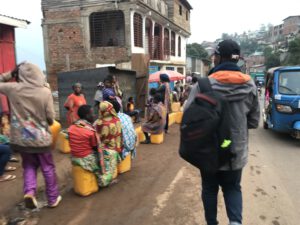It sounds crazy: the Democratic Republic of Congo is a country to which the river has not only given its name. The Congo River, which encircles the country from east to west, is the second longest river in Africa with a length of 4374 km. Measured by its water flow of 41,800 m³/s, it is the continent’s most water-rich river and, at 220 m deep, even the deepest river in the world. In addition, the country borders the region of Africa’s great lakes, of which Lake Tanganyika alone is the length of Great Britain when measured from north to south. And here it comes: the population of Congo suffers from a lack of water, especially in the cities!
In Bukavu, the capital of the South Kivu region, and in Goma, the capital of the North Kivu region, two cities on the state border with Rwanda and separated by Lake Kivu, you have to walk more than two kilometres to find water. It is often the task of children to provide the family with water on a daily basis.

This leads to the children having to set out at dawn to fetch water. An arduous task, considering that a filled jerry can weighs more than 20kg and cannot be ergonomically carried on the back. In addition, the children often miss valuable school time when there are unexpected delays at the water points, for example when once again only a little water runs out of the tap. And there is something else: the children are at increased risk of becoming victims of violent crime, especially in the early hours of the morning when it is still dark.
Since the supply of clean drinking water is a basic need, it should actually be one of the most urgent tasks of the government to ensure that the population has easy access to water. As it is so often the case in countries with great poverty and high corruption, people are left to fend for themselves.